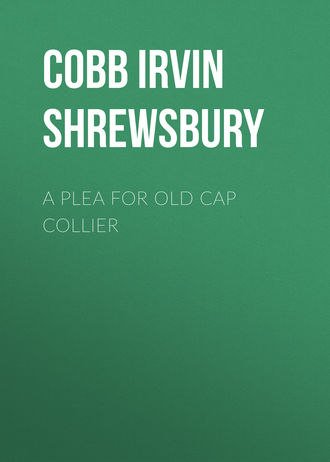
Cobb Irvin Shrewsbury
A Plea for Old Cap Collier
We might have told our parents, had we had the words in which to state the case and they but the patience to listen, that in a nickul librury there was logic and the thrill of swift action and the sharp spice of adventure. There, invariably virtue was rewarded and villainy confounded; there, inevitably was the final triumph for law and for justice and for the right; there embalmed in one thin paper volume, was all that Sandford and Merton lacked; all that the Rollo books never had. We might have told them that though the Leatherstocking Tales and Robinson Crusoe and Two Years Before the Mast and Ivanhoe were all well enough in their way, the trouble with them was that they mainly were so long-winded. It took so much time to get to where the first punch was, whereas Ned Buntline or Col. Prentiss Ingraham would hand you an exciting jolt on the very first page, and sometimes in the very first paragraph.
You take J. Fenimore Cooper now. He meant well and he had ideas, but his Indians were so everlastingly slow about getting under way with their scalping operations! Chapter after chapter there was so much fashionable and difficult language that the plot was smothered. You couldn't see the woods for the trees, But it was the accidental finding of an ancient and reminiscent volume one Sunday in a little hotel which gave me the cue to what really made us such confirmed rebels against constituted authority, in a literary way of speaking. The thing which inspired us with hatred for the so-called juvenile classic was a thing which struck deeper even than the sentiments I have been trying to describe.
The basic reason, the underlying motive, lay in the fact that in the schoolbooks of our adolescence, and notably in the school readers, our young mentalities were fed forcibly on a pap which affronted our intelligence at the same time that it cloyed our adolescent palates. It was not altogether the lack of action; it was more the lack of plain common sense in the literary spoon victuals which they ladled into us at school that caused our youthful souls to revolt. In the final analysis it was this more than any other cause which sent us up to the haymow for delicious, forbidden hours in the company of Calamity Jane and Wild Bill Hickok.
Midway of the old dog-eared reader which I picked up that day I came across a typical example of the sort of stuff I mean. I hadn't seen it before in twenty-five years; but now, seeing it, I remembered it as clearly almost as though it had been the week before instead of a quarter of a century before when for the first time it had been brought to my attention. It was a piece entitled, The Shipwreck, and it began as follows:
In the winter of 1824 Lieutenant G–, of the United States Navy, with his beautiful wife and child, embarked in a packet at Norfolk bound to South Carolina.
So far so good. At least, here is a direct beginning. A family group is going somewhere. There is an implied promise that before they have traveled very far something of interest to the reader will happen to them. Sure enough, the packet runs into a storm and founders. As she is going down Lieutenant G– puts his wife and baby into a lifeboat manned by sailors, and then—there being no room for him in the lifeboat—he remains behind upon the deck of the sinking vessel, while the lifeboat puts off for shore. A giant wave overturns the burdened cockleshell and he sees its passengers engulfed in the waters. Up to this point the chronicle has been what a chronicle should be. Perhaps the phraseology has been a trifle toploftical, and there are a few words in it long enough to run as serials, yet at any rate we are getting an effect in drama. But bear with me while I quote the next paragraph, just as I copied it down:
The wretched husband saw but too distinctly the destruction of all he held dear. But here alas and forever were shut off from him all sublunary prospects. He fell upon the deck— powerless, senseless, a corpse—the victim of a sublime sensibility!
There's language for you! How different it is from that historic passage when the crack of Little Sure Shot's rifle rang out and another Redskin bit the dust. Nothing is said there about anybody having his sublunary prospects shut off; nothing about the Redskin becoming the victim of a sublime sensibility. In fifteen graphic words and in one sentence Little Sure Shot croaked him, and then with bated breath you moved on to the next paragraph, sure of finding in it yet more attractive casualties snappily narrated.
No, sir! In the nickul librury the author did not waste his time and yours telling you that an individual on becoming a corpse would simultaneously become powerless and senseless. He credited your intelligence for something. For contrast, take the immortal work entitled Deadwood Dick of Deadwood; or, The Picked Party; by Edward L. Wheeler, a copy of which has just come to my attention again nearly thirty years after the time of my first reading of it. Consider the opening paragraph:
The sun was just kissing the mountain tops that frowned down upon Billy-Goat Gulch, and in the aforesaid mighty seam in the face of mighty Nature the shadows of a Warm June night were gathering rapidly.
The birds had mostly hushed their songs and flown to their nests in the dismal lonely pines, and only the tuneful twang of a well-played banjo aroused the brooding quiet, save it be the shrill, croaking screams of a crow, perched upon the top of a dead pine, which rose from the nearly perpendicular mountain side that retreated in the ascending from the gulch bottom.
That, as I recall, was a powerfully long bit of description for a nickul librury, and having got it out of his system Mr. Wheeler wasted no more valuable space on the scenery. From this point on he gave you action—action with reason behind it and logic to it and the guaranty of a proper climax and a satisfactory conclusion to follow. Deadwood Dick marched many a flower-strewn mile through my young life, but to the best of my recollection he never shut off anybody's sublunary prospects. If a party deserved killing Deadwood just naturally up and killed him, and the historian told about it in graphic yet straightforward terms of speech; and that was all there was to it, and that was all there should have been to it.
At the risk of being termed an iconoclast and a smasher of the pure high ideals of the olden days, I propose to undertake to show that practically all of the preposterous asses and the impossible idiots of literature found their way into the school readers of my generation. With the passage of years there may have been some reform in this direction, but I dare affirm, without having positive knowledge of the facts, that a majority of these half-wits still are being featured in the grammar-grade literature of the present time. The authors of school readers, even modern school readers, surely are no smarter than the run of grown-ups even, say, as you and as I; and we blindly go on holding up as examples before the eyes of the young of the period the characters and the acts of certain popular figures of poetry and prose who—did but we give them the acid test of reason—would reveal themselves either as incurable idiots, or else as figures in scenes and incidents which physically could never have occurred.
You remember, don't you, the schoolbook classic of the noble lad who by reason of his neat dress, and by his use in the most casual conversation of the sort of language which the late Mr. Henry James used when he was writing his very Jamesiest, secured a job as a trusted messenger in the large city store or in the city's large store, if we are going to be purists about it, as the boy in question undoubtedly was?
It seems that he had supported his widowed mother and a large family of brothers and sisters by shoveling snow and, I think, laying brick or something of that technical nature. After this lapse of years I won't be sure about the bricklaying, but at any rate, work was slack in his regular line, and so he went to the proprietor of this vast retail establishment and procured a responsible position on the strength of his easy and graceful personal address and his employment of some of the most stylish adjectives in the dictionary. At this time he was nearly seven years old—yes, sir, actually nearly seven. We have the word of the schoolbook for it. We should have had a second chapter on this boy. Probably at nine he was being considered for president of Yale—no, Harvard. He would know too much to be president of Yale.







